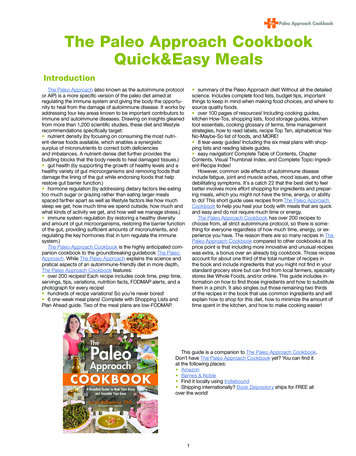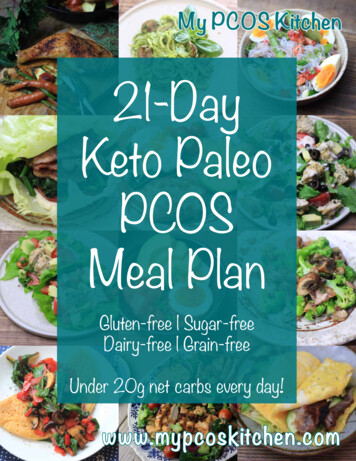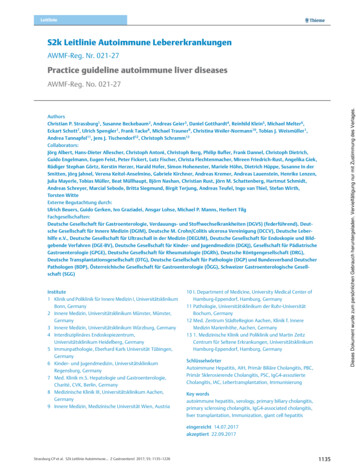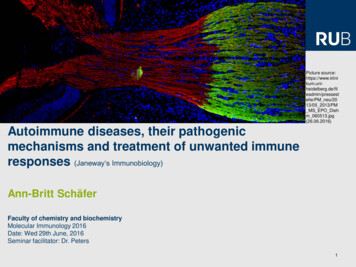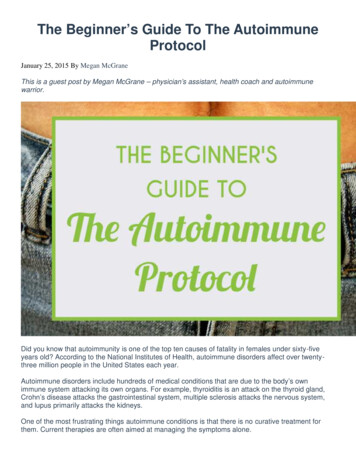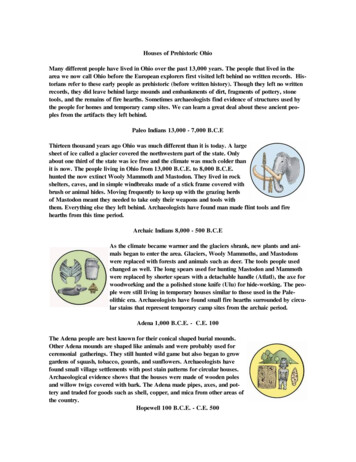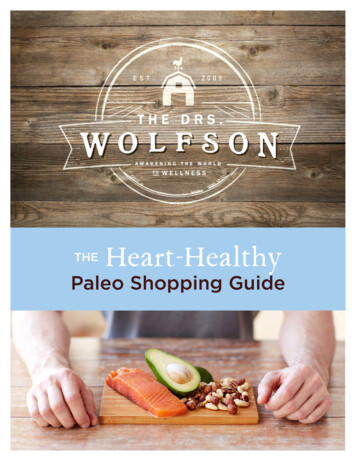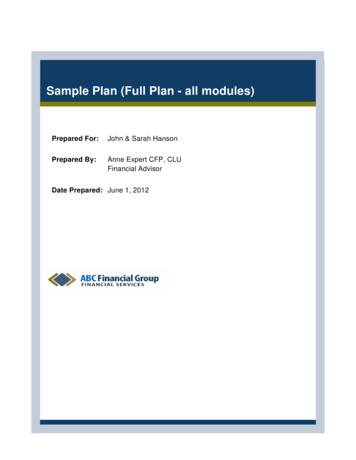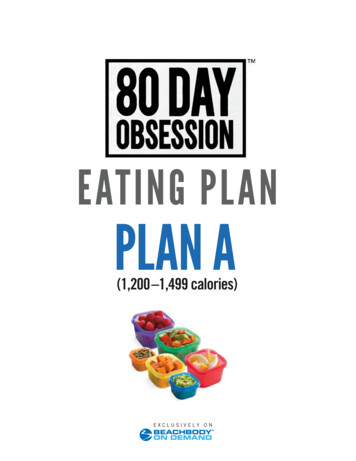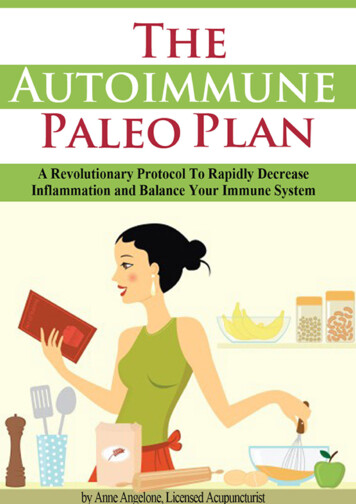
Transcription
The Autoimmune Paleo PlanA Revolutionary Protocol ToRapidly Decrease Inflammation andBalance Your Immune SystembyAnne Angelone
Copyright by Anne Angelone 2013All Rights Reserved. No part of this publication may be reproduced in any form or by anymeans, including scanning, photocopying, or otherwise without prior written permission of thecopyright holder.ISBN:978-1-62154-593-4 (digital)DisclaimerThis program manual is not intended to provide medical advice or to take the place of medicaladvice and treatment from your personal physician. Readers are advised to consult their owndoctors or other qualified health professionals regarding the treatment of medical conditions. Theauthor, shall not be held liable or responsible for any misunderstanding or misuse of theinformation contained in this program manual or for any loss, damage, or injury caused or allegedto be caused directly or indirectly by any treatment, action, or application of any food or foodsource discussed in this program manual. The statements in this program manual have not beenevaluated by the U.S. Food and Drug Administration. This information is not intended todiagnose, treat, cure, or prevent any disease. To request permission for reproduction or inquireabout private consulting or classes, please contact:Anne Angelone, MS, Licensed Acupuncturistwebsite: www.anneangelone.com
IntroductionYou are probably reading this right now because you suffer from anautoimmune condition and know from personal experience that certainfoods contribute to your body discomfort and inflammation. You are likelyin need of a reliable plan that inspires you, or perhaps you are seeking torefine your current dietary approach. Perhaps you’d like to grasp thedepth of the conversation going on between you and the food you eat.I see patients with various autoimmune conditions such as RA, AnkylosingSpondylitis, Hashimoto's Thyroiditis, Psoriasis, Eczema, Ulcerative Colitis,and Celiac at my clinic in San Francisco.Without exception, autoimmune patients are in need of an effective antiinflammatory diet and lifestyle plan to calm down and balance theiroveractive immune systems.The following are some general concerns of autoimmune patients:1. Knowing what to eat and what to avoid.2. Resolving dysbiosis, SIBO, and repairing leaky gut.3. Cooling inflammation and oxidative stress.4. Balancing the immune system.5. Reducing stress and improving sleep.Current discoveries in the field of immunity confirm that certain foods andbacteria irritate the mucosal lining of the gut and contribute both tointestinal permeability (aka leaky gut) and the autoimmune response,generally experienced as a flare-up, attack, or an exacerbation ofsymptoms.The goal of The Autoimmune Paleo Plan is to fix your leaky gut andeliminate food and bacterial triggers to autoimmune reactions with theultimate intention of decreasing your flare-ups and severity of autoimmuneattacks.For anyone with an autoimmune disease, eliminating known inflammatoryfoods from your diet, resolving dysbiosis, and healing the mucosal liningof the small intestine are the keys to optimal health and balanced
immunity.It may be a new lens through which to consider how poorly digested foodscontinue to irritate the lining of your gut, feed your yeast and bacterialovergrowths, trigger autoantibody responses, and may set the stage foryou to express your genetic tendency to autoimmunity. Yet, since 80% ofyour immune system is in your gut, you probably already know thatdigestive health is of paramount importance in healing autoimmuneconditions.The Autoimmune Paleo Plan is designed to rapidly reduce inflammationand heal intestinal permeability via specific dietary interventions. To calmdown the immune/inflammatory response and allow the gut to heal, youwill need to remove the major offending foods: eggs, grains, alcohol,nightshades, nuts, seeds, legumes, and dairy for at least 30 days.Some will need to continue for several months to a year.While on the The Autoimmune Paleo Plan, it is important to identify andremove overgrowths of yeast, bacteria and parasites that may also bedriving your immune/inflammatory response.The goal is to increase anti-inflammatory and probiotic foods to heal theintegrity of the gut lining while simultaneously eliminating the foods thatcreate a low grade immune/inflammatory response, irritate the gut lining,and feed harmful bacteria (which lead to SIBO and dysbiosis). Byeliminating the underlying mechanisms that drive inflammation andautoimmunity, you can modulate and bring balance to your overactiveimmune system.Why Paleo?Paleo is the term used to revere the diet of our pre-agricultural ancestorssince it was free of all the grains, processed foods, and sugars that seemto be causing the chronic diseases we face today. In current times,Autoimmune Paleo refers to a lifestyle of embracing an egg, grain,legume, sugar, nightshade, nut/seed, alcohol, and dairy free template ofreal food nutrition. Based on the fact that these foods are the worst
triggers of chronic autoimmune reactions, we can appreciate this stellardietary template for autoimmune conditions.What's the Plan?In essence, you will be utilizing a nutrient dense, plant strong nutritionalmodel designed to remove foods that activate immune responses, irritatethe gut lining, and contribute to leaky gut. After 30 days on this plan youshould notice significant health benefits. Some will need to continuestrictly on this plan for 1 year or longer before any potential food triggerscan be introduced.Exercising for 30 minutes a day is a natural anti-inflammatory and isencouraged for balanced immune function and enhanced sleep.The Autoimmune Paleo Plan is encouraged as a safe way of decreasinginflammation in your body and helping to heal your leaky gut. Followingthe “foods to include” list will supply you with nutrient dense, bioavailablevitamins and minerals. Your immune system and genes will be shored upwith the right nutrition, allowing your inflamed gut to begin healing.The dietary emphasis on whole, organic, and nutrient dense foodscontributes to optimal digestion and immune function with antiinflammatory and antioxidant rich fruit and veggies. Blood sugar willstabilize and adrenals will strengthen with lots of minerals and aminoacids from both protein and veggies. Probiotic and cultured foods will helpto reduce intestinal inflammation and provide the nutrients necessary forhealthy intestinal micro-flora. Add to that lots of water and herbal teas andyou’ll be off to a great start.Other significant considerations for autoimmune conditions includeresolving dysbiosis, supporting detoxification and methylation, ramping upglutathione, and increasing regulatory T-cells with vitamin D, probiotics,and fish oils. All of this will go a long way to reduce inflammation andbalance the immune system.Many thanks to leaders who have influenced me in the field of FunctionalMedicine and Paleo Nutrition: Dr. Eric Gordon, Dr. Tom O’Bryan, Dr. Terry
Wahls, Dr. Jeffrey Bland, Dr. Datis Kharrazian, Dr. Alex Vasquez, Dr.Mark Hyman, Dr. Alison Siebecker, Sarah Ballantine, Ph.D., ChrisKresser MS, L.Ac., Diane Sanfilippo, BS, NC, Robb Wolf, Nora Gegaudas,Dr. Loren Cordain, Mat Lalonde Ph.D, Dr. Alessio Fasano, ElaineGottschall, Natasha Campbell McBride, Stephen Wright and JordanReasoner.The Autoimmune Paleo Plan is inspired by successful treatment outcomesin applying Nutrigenomics, Functional Medicine, Dr. Kharazzian’sRepairVite program, and the Paleo Autoimmune Protocol. Many thanks toElaine Fawcett and Sarah Ballantyne, PhD. for help in writing, editing andgetting the word out about nutrition for autoimmune conditions.
What triggers autoimmunity?We now know that genes and the environment are not the only twopredisposing factors for autoimmunity. It is now recognized that our genesand environmental triggers interact only due to a breach in the intestinalbarrier.Leaky gut is now recognized as the breached barrier through which ourgenes and environmental triggers interact and is thus considered the thirdpredisposing factor that sets the stage for autoimmune reactions.
What exactly is leaky gut?Intestinal permeability (aka leaky gut) refers to the opening of the mucosallining in the small intestine, which allows food, yeast, and bacteria in theintestines to interact with the immune system.Dr. Alessio Fasano, of the Maryland Center for Celiac Research, hasdemonstrated that intestinal permeability or “leaky gut” plays a significantrole in triggering most autoimmune conditions.Considering this connection, healing a leaky gut may prove to be the keyto halting the progression of autoimmunity. The questions to keep in mindin terms of preventing autoimmune reactions are:1. What triggers leaky gut?2. Can I identify and remove gut irritants?3. Is there a way to hack my genes to shut down the inflammatoryresponse and allow for disease free expression?
How Do I Know If I Have Leaky Gut Syndrome?These days you can do a test to find our and some obvious signs of leakygut syndrome include gas, bloating, poor digestion, multiple food andchemical sensitivities, gut pain, and inflammation.Some not so obvioussigns of leaky gut (which manifest outside the small intestine) includedecreased mental clarity (aka brain fog), headache, depression, allergies,eczema, body aches, and fatigue.Fixing a leaky gut is definitely a priority for autoimmune conditions.The plan is always to remove leaky gut triggers, resolve dysbiosis, andrestore a healthy intestinal barrier to reduce any systemic inflammatoryreactions that are driving auto-antibody attacks (i.e. your autoimmunecondition).Intestinal permeability has been found in connection with the followingautoimmune diseases:Ankylosing Spondylitis, Apthous stomatitis,asthma, autism, autoimmune gastritis, autoimmune hepatitis, Behcet'sSyndrome, Celiac disease, Depression, Dermatitis Herpetiformis, Type 1Diabetes, Eczema, Gut migraine in children, and Hashimoto's Thyroiditis.Leaky gut is also frequently seen in asthma, psoriasis, and nearly all ofthe currently so called idiopathic juvenile arthritides.The most common triggers of leaky gut are gluten, lectins, saponins,dysbiosis, SIBO, oral contraceptives, alcohol, antacids containingaluminum hydroxide, aspirin, naproxen, ibuprofen, acetaminophen,corticosteroids, antibiotics and chronic stress.Gluten, lectins and saponins are plant proteins that can be difficult todigest and therefore may contribute to "leaky gut”. Since these proteinsmay degrade the mucosal lining of the gut and lead to autoimmunereactions, patients with autoimmune conditions should avoid them whileon this plan and possibly longer.
SIBO and DysbiosisBeyond removing inflammatory foods and healing a leaky gut, patientswith autoimmune conditions need to investigate small intestine bacterialovergrowth and dysbiosis that may contribute to leaky gut and the autoantibody response. Dysbiosis refers to an overgrowth of yeast, bacteria,and/or parasites located in the gastrointestinal tract.Small Intestine Bacterial Overgrowth (SIBO) is now being considered as asignificant yet overlooked cause of IBS. SIBO can cause nausea, gas,bloating, diarrhea, and/or constipation. Bacterial toxins from SIBO (calledlipopolysaccharides) can impair absorption, and result in nutrientdeficiencies, fat malabsorption, food intolerances, poorly functioningdigestive enzymes, leaky gut, and the auto-antibody response (i.e.autoimmune reactions).
What Causes Bacterial Overgrowth?The entire gastrointestinal (GI) tract contains bacteria, both good and bad.The small intestine contains bacteria different from that of the largeintestine. In the case of SIBO, the small intestine contains too muchbacteria, and these bacteria more closely resemble the bacteria of thecolon. These bacteria consume sugars and carbohydrates, producinglarge amounts of gas. FODMAP malabsorption (see below), inadequatedietary fiber, hypochlorhydria (decreased stomach acid), and pancreaticenzyme deficiency set the stage for inadequate digestion in susceptibleindividuals and contribute to poorly digested carbs which in turn feedbacteria in the small intestine. Bacterial endotoxins, calledlipopolysaccharadies, further contribute to leaky gut and the inflammatoryfire that needs to be extinguished.To correct the problem, a no grain, low starch diet is imperative andsuggested in the Autoimmune Paleo Plan. Some may need to completelyrestrict allowable starches like yams and sweet potatoes and go for a «nostarch» version of the Autoimmune Paleo Plan to completely starve SIBO(i.e. no yams, sweet potatoes, dense carbs) Others may also need to useantibiotics and/or botanical antimicrobials (dysbiotics) along with extrahydrochloric acid and digestive enzyme supplementation.
Food SensitivitiesImmunogenic or Allergenic?Immunogenic reactions to foods are inflammatory responses whichactivate part of the immune system but will not cause an IgE allergyresponse or anaphylactic shock. This causes a low grade inflammatoryresponse or an IgG reaction. This means that you are sensitive, ratherthan allergic. There are many possible foods that may be creating thisresponse in your immune system. Common foods that create thisresponse include gluten, dairy, corn, soy, and nightshade vegetables.With a smoldering and undetected IgG response, along with a leaky gut,the potential for the autoantibody response also increases as yourimmune system is now on high surveillance in order to attack the similarprotein structures of the offending foods. In the cross-fire, your immunesystem may confuse your joint tissue or your thyroid as “foreign”. Eventhough it's trying to do its job, think of it as the immune system coping withan unnecessary burden that can be dropped by eliminating these foods.Cross Reactive ProteinsIf you have a known gluten intolerance, as most with autoimmuneconditions do, proceed with caution if reintroducing these proteins as theymay cause the same antibody/inflammatory reaction as gluten does: dairyproteins (casein, casomorphin, butyrophilin, and whey), oats,brewer/baker’s yeast, instant coffee, sorghum, millet, corn, rice andpotato.If symptoms come back after going off the protocol, you can always returnto the AIP template to rapidly decrease the inflammatory response.Always check with your doctor if you have a flare up of symptoms.The Autoimmune Paleo Plan attempts to reduce known allergenic andimmunogenic substances in order to reduce the immune/inflammatoryresponse that many patients are getting from these foods.
Support your immune system:Going Beyond TH1 and TH2When we manage an autoimmune disease in functional medicine, weidentify why the immune system is imbalanced, and then work to restorethat balance. The pro-inflammatory side of the immune system (alsocalled “TH-1”) responds immediately to an invader in the body. The antiinflammatory side of the immune system (“TH-2”) has a delayed responseand produces antibodies to an invader. These antibodies tag the invaderso that if it shows up again, the immune system can respond morequickly. In a healthy person, these two systems work in balance.However, in the person with an autoimmune disease, one of thesesystems has become overly dominant.This polarity between TH-1 and TH-2 underlies autoimmune conditions,and we use nutritional therapies to help restore balance. This helps tameinflammation and autoimmune disease.The New Immune Player: TH-17Studies have increasingly spotlighted another important player in theimmune system called TH-17. While appropriate expression of TH-17 isimportant for immune defense, over-activation of TH-17 plays a key role inautoimmune disease and chronic inflammatory disease. When it comes toquenching flare-ups, TH-17 is our newest target. Since TH17 activatesNuclear Factor Kappa Beta, if we can remove triggers and break the cycleof inflammation with specific nutrients and botanicals, we can go a longway to decreasing inflammation.NutrigenomicsFor all autoimmune reactions, the goal is the suppression of theinflammatory response. Nutrigenomics is an exciting field of nutritionalscience that looks at how food/nutrients can regulate inflammatory geneexpression and thus suppress the inflammatory response.The process of silencing inflammatory gene suppression via certainnutrients is called DNA methylation.Many patients with autoimmune conditions are genetically predisposed tomethylation defects and need to consider supplementing with folate,
vitamin B6, and vitamin B12 to ensure proper methylation. Daily greensmoothies will supply a good source of these methylation factors and areencouraged.Hacking inflammation via silencing NFKB: Nuclear Factor Kappa BetaNFKB is a pivotal transcription factor that stimulates pro-inflammatorygene expression. When we investigate what activates NFKB, we canappreciate why it’s important to treat the root cause of inflammation.Leaky gut, dysbiosis, SIBO, food sensitivities, stress, and viruses can allactivate NFKB and lead to an increased expression of pro-inflammatorygenes that code for the production of inflammatory cytokines. Of coursethe goal is to root out the triggering source of this inflammatory responseby eliminating poorly digested proteins, resolving dysbiosis, SIBO, andhealing up your leaky gut.Along the way we can modulate NFKB with botanicals like curcumin.Supporting nitric oxide system pathways with Huperzine A, Vinpocetine,Adenosine, Alpha-Ketogluteric Acid, and L Acetylcarnitine is another keyaspect of autoimmune regulation. This will aid in dampening inflammationand lead to tissue repair.The addition of these remedies, along with eliminating the causes, breaksthe cycle of inflammation by decreasing TH17 and inhibiting NFKB. Thisshuts down the expression of inflammatory genes, their cascade ofcytokines, and the progression of your autoimmune condition.Immune RegulationCurcumin also work by supporting “regulatory T cells.” These cells dowhat they say—they regulate the activity of TH-17, TH-1, and TH-2,keeping all the facets of the immune system in check. When they don’twork efficiently, the immune system can tip out of balance, thus promotinginflammation and autoimmunity. Other compounds that successfullysupport this regulatory system include vitamin D3, vitamin A, fish oil, andspecific probiotic strains. Also nutrients that boost activity of our masterantioxidant glutathione like NAC, Alpha lipoic acid, L-glutamine, Milk
Thistle, Cordyceps, Centella Asiatica, Selenium, and nutrients that act onnitric oxide pathways as recommended above.Getting started on the Plan:The Autoimmune Paleo PlanGuidelines:Do’s Eat organic, pastured, grass fed animal protein and wild fish. Eat carbohydrates from fruits and vegetables. Eat fat from avocados, coconut, and olive oil. Eat low glycemic fruits and non-starchy vegetables. Eat fermented foods like sauerkraut, coconut kefir, and yogurt. Eat Superfoods on a daily basis. Eat fiber from fruits and vegetables. Eat colorful veggies. Drink 8 glasses of water including veggie or bone broth daily. Exercise every day, preferably for 30 minutes. Meditate for at least 5 minutes per day. Take daily detox baths with Epsom salts, and baking soda. Drink green smoothies daily. Get 7-9 hours of sleep. Consider digestive enzymes, hydrochloric acid, and apple cidervinegar.Don'ts: No grains at all. No dairy products No genetically modified organism (GMO) foods. No processed foods. No refined sugars. No wine or alcohol. No cereals or grain like seeds. No smoked or salted foods. No ibuprofen, aspirin or acetaminophen, naproxen. No legumes (e.g. peanuts, beans, lentils, peas, and soybeans). No nuts, seeds or seed based spices. No nightshade vegetables. No fruit juices. No skipping meals.
The Autoimmune Paleo PlanFoods To Include:Fruits:Apples, apricots, Asian pears, bananas, blueberries, blackberry,boysenberry, cherries, cranberry, figs, grapefruit, kiwi, lemons, limes,melons, nectarine, oranges, peaches, pears, persimmons, plums, pluots,plantains, pomegranate, raspberry, strawberry.Caution: watermelon, mango, pineapple, grapes, dried fruits, dehydratedfruits.Vegetables:Asparagus, arugula, artichoke, avocado, basil, beet, beet greens, broccoli,broccoli rabe, burdock, bok choy, cabbage, carrots, cauliflower, celery,chard, chicory, collards, chard, cucumber, scallion, Jerusalem artichoke,jicama, kale, kohlrabi, lambsquarters, leeks, lettuce, mustard, nettles,okra, onions, purslane, spinach, summer squash, turnips, artichokehearts, Brussels sprouts, daikon radish, zucchini, fennel root, dandeliongreens, red cabbage, green cabbage, Napa cabbage, water chestnuts,watercress, radish, shallot, turnips.Dense carbs: Beets, acorn squash, butternut squash, yams, sweetpotato, taro, plantain and lotus root,Dense carb FODMAPs: yams, butternut squash and sweet potatoes.Fungi: Button mushrooms, portabella, oyster, chanterelle, puffball,crimini, etc.Wild fish: Salmon, mackerel, herring, halibut, shellfish, oysters, cod, tuna,flounder, sardines, hake, skate, trout, red snapper, etc.Meat: Beef, chicken; quail, squab, duck, goose, turkey, Cornish gamehen; pasture-raised lamb, pork, buffalo/bison, goat, emu, ostrich, sausage(without fillers or nightshade spices); liver, kidney, heart, organic slicedmeats (gluten, sugar free), uncured nitrate/nitrite-free deli meats andbacon from grass-fed/pastured beef/pork.Milk and yogurt: coconut milk, unsweetened coconut yogurt.
Fats: extra virgin olive oil, coconut oil, flaxseed, sesame, walnut, hazelnutoil, coconut oil, red palm oil.Caution: nut and seed based oils: flaxseed oil, sesame oil, walnut oil,hazelnut oil, macadamia nut oil.Coconut: coconut oil, coconut butter, coconut milk, coconut cream,unsweetened coconut yogurt, unsweetened coconut flakes, coconutaminos, coconut kefir.Beverages: filtered or distilled water, herbal tea, mineral water, broths,freshly made veggie juice, green smoothies, kombucha, kefir water,coconut kefir.Teas: Herbal teas: Peppermint, ginger, lemongrass,chamomile, rooibos, lavender, cinnamon, milk thistle.spearmint,Fermented foods: sauerkraut, pickles, pickled ginger, pickledcucumbers, unsweetened coconut yogurt, unsweetened coconut kefir(without corn or rice-based thickening agents), kombucha, kimchee, kefirwater, pickles fermented with salt, beet kvass, lacto-fermented vegetablesand fruits such as fermented beets, carrots, and green papaya.Condiments: Apple cider vinegar, Balsamic vinegar, coconut vinegar,Red Boat fish sauce and coconut aminos.Herbs and spices: turmeric, ginger, rosemary, basil, cilantro, garlic,ginger, lemongrass, peppermint, oregano, parsley, sage, sea, salt, thyme,tarragon, spearmint, marjoram, mace, chives, chamomile, chervil,cinnamon, bay leaves, cloves, dill, horseradish, saffron, sea salt.Caution: black pepper, allspice, white, green and pink peppercorns,juniper, cardamom, star anise and vanilla bean.Sugar substitutes: cinnamon, mint and ginger.Caution: honey, maple syrup, molasses, unrefined cane sugar, and datesugar.
Foods to Eliminate:Nightshade vegetables: this includes potatoes (not sweet potatoes), alltomatoes, red and green peppers, chili peppers, eggplants, tomatillos,sweet bell peppers, jalapenos, cayenne, Habanero, Anaheim and Serranoet al. peppers. Avoid chili peppers in dried powders such as paprika, chilipowder, curry powder, chili pepper flakes, hot sauces, Tabasco sauces,salsas, goji berries and ashwaganda.Fruit: avoid canned fruits.Caution: watermelon, mango, pineapple, grapes, dried fruits anddehydrated fruitsProcessed and canned meats: bacon, fatty cuts of lamb, beef, pork, delimeats, smoked/dried/salted meat and fish.Sausages and deli meats with seed-based or nightshade spices.Fish: Whale, shark, swordfish.Farmed tilapia and catfish quantities should be moderate.Nuts and Seeds: Avoid all nuts and seeds including almonds, Brazilnuts, cashews, chestnuts, hazelnuts, macadamias, pecans, walnuts, pinenuts, pistachios, pumpkin, and sunflower seeds and seed based spices:anise, annatto, black cumin, celery, coriander, cumin, dill, fennel,fenugreek, mustard, nutmeg, poppy, sesame.Dairy: cow and other animal (goat/sheep) milks, cheese, cottage cheese,cream, butter, yogurt, ice-cream, non-dairy creamers, soy milk, whey,butter, cheeses, frozen desserts, mayonnaise.Oils: margarine, butter, shortening, any processed hydrogenated oils,peanut oil, mayonnaise.Beans and Legumes: avoid-all beans, black-eyed peas, cashews,chickpeas, lentils, miso, peas, peanuts/peanut butter, soybean and soyproducts.
Fungi: avoid medicinal mushrooms e.g. Shiitake, Maitake andReishi mushrooms.Soy: soy milk, soy sauce, tofu,tempeh, soy protein, edamame.Drinks: sodas, fruit juice, alcoholic beverages, coffee, green, black tea, allcaffeinated beverages.Condiments: ketchup, relish, soy sauce, BBQ sauce, chutneys, othercondiments, baker’s and brewer’s yeast.Sweeteners: avoid white or brown sugar, high fructose corn syrup, cornsyrup, fruit sweeteners, Truvia, maple syrup, agave, brown rice syrup,Splenda, Equal, Nutrasweet, Xylitol, stevia, raw green stevia.Grains: amaranth, barley, buckwheat, corn including cornmeal andpopcorn, millet, oats, oatmeal, quinoa, rice, rye, sorghum, teff, triticale,and wheat including varieties such as spelt, emmer, farro, einkorn, kamut,durum and other forms such as bulgur, cracked wheat and wheat berries.Grain products: corn tortillas, chips, starch, syrup, noodles, cakes,breads, rolls, muffins, noodles, crackers, cookies, cake, doughnuts,pancakes, waffles, pasta, tortillas, pizza, pita, flat bread.Grain like substances or pseudo-cereals: amaranth, buckwheat,cattail, chia, cockscomb, kañiwa, pitseed, goosefoot, quinoa, andwattleseed (aka acacia seed).Gluten containing foods: BBQ sauce, binders, bouillon, brewer’s yeast,cold cuts, condiments, emulsifiers, fillers, gum, hot dogs, hydrolyzed plantand vegetable protein, ketchup, soy sauce, lunch meats, malt, maltflavoring, malt vinegar, matzo, modified food starch, monosodiumglutamate, non-dairy creamer, processed salad dressings, seitan,stabilizers, teriyaki sauce, textured vegetable protein.Legumes: including peas, beans, lentils, soy, and peanuts.
Lectins: Avoid nuts, beans, soy, potatoes, tomato, eggplant, peppers,peanut oil, peanut butter, soy oil, etc.Dairy: all dairy products, including milk cream, cheese, from cows, goats,sheep, etc.Eggs: or foods that contain eggs (e.g. mayonnaise).Alcohol: all alcohol.All processed food: cured meats, sugar, pre-mixed seasonings andsauces, mayonnaise, mustard, canned foods.Sugars: Avoid: white or brown sugar, high fructose corn syrup, cornsyrup, fruit sweeteners, Truvia, agave, brown rice syrup, Splenda, Equal,Nutrasweet, Xylitol, stevia, raw green stevia, coconut sugar and palmsugar.Seed based spices: anise, annatto, black cumin, celery, coriander,cumin, dill, fennel, fenugreek, mustard, nutmeg, poppy, sesame, cacao.Berry and fruit based spices: black pepper, allspice, white, green andpink peppercorns, juniper, cardamom, star anise and vanilla bean.Coffee: Remove coffee for 30 days, reintroduce and note reactions.Tea: Remove caffeinated teas for 30 days, reintroduce and notereactions.Avoid immune stimulants: Echinacea purpurea extract, astragalus,ashwaganda, beta glucans, chlorella, glycyrrhiza, licorice root, goldenseal,panax ginseng, grape seed extract, Melissa officinalis (lemon balm),Maitake, Reishi, Shiitake, caffeine, green tea, coffee, lycopene, pine barkextract, willow bark, pycnogenol, genistein, quercetin.
A word about Caution foods:Generally speaking, these foods are either immunogenic, hard to digest,likely to feed gut bacterial overgrowths, dysbiosis, and/or contribute toblood sugar imbalance. If your gut immunity is strong (no overgrowths, nodysbiosis, no food reactions, healthy gut lining), and your blood sugar isbalanced, these items may be tolerated in moderation.Considerations:FODMAPs: describe short-chain carbohydrates found in many commonfoods. FODMAPs stands for Fermentable Oligo-, Di- and Monosaccharides, and Polyols (sugar alcohols).FODMAP intolerance can tip you off to the possibility of having smallintestine bacterial overgrowth. If poorly digested, these carbs will feed badbacteria (SIBO), which in turn produce methane and hydrogen gas thatcan cause bloating, cramping, burping, gas, diarrhea and other bowelproblems that generally get diagnosed as IBS. If these bacterialovergrowths remain untreated, they may contribute to leaky gut and theinflammatory/immune response.If you have IBS symptoms and are not improving on the standard PaleoAutoimmune Protocol, the best way to check for FODMAP sensitivitywould be to remove these foods for at least 30 days and then reintroducethem and check for SIBO if there is no change. If you desire to reintroducethese foods, make sure you have resolved the root cause of yourFODMAP intolerance to avoid symptoms.FODMAPs in the AIPP:Apples, artichokes, apricots, cherries, pears, plum, persimmon,nectarines, peaches, pluots, artichoke, asparagus, cabbage, garlic, leeks,okra, onions, radicchio, avocado, beet root, broccoli, Brussels sprouts,mushrooms, butternut squash, pumpkin, cauliflower, celery, fennel bulb,mushrooms, sauerkraut, dried coconut, coconut flour, coconut milk,coconut cream, coconut butter, honey, grapes, dried fruits, blackberries,apricots, shallots.
SIBO caution foods in the AIPP: Parsnips, yams jicama, kohlrabi, okra,sweet potato, taro, plantain, Jerusalem artichoke, parsnips, lotus root,cassava root, manioc, tapioca, yucca.Reintroduction of Foods:Eliminate any foods on the “include” list that you suspect are problematicand do not agree with your constitution. For those not improving on thestandard AIP and for those considering reintroduction of foods, it’simportant to be aware of the foods, herbs and compounds that maycontribute to your symptoms and/or autoim
the gut lining, and contribute to leaky gut. After 30 days on this plan you should notice significant health benefits. Some will need to continue strictly on this plan for 1 year or longer before any potential food triggers can be introduced. Exercising f
